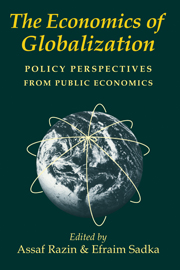Book contents
- Frontmatter
- Contents
- Preface
- List of Contributors
- Introduction
- I International Mobility of Technology
- II Capital Flows and Exchange-Rate Misalignment
- 2 International Implications of German Unification
- 3 Real-Exchange-Rate Misalignments and Growth
- III Tax Incentives and Patterns of Capital Flows
- IV Limits to Income Redistribution in Federal Systems
- V Tax Harmonization, Tax Coordination, and the “Disappearing Taxpayer”
- VI Political-Economy Aspects of International Tax Competition
- VII Migration of Skilled and Unskilled Labor
- VIII Fiscal Aspects of Monetary Unification
- Index
2 - International Implications of German Unification
Published online by Cambridge University Press: 28 January 2010
- Frontmatter
- Contents
- Preface
- List of Contributors
- Introduction
- I International Mobility of Technology
- II Capital Flows and Exchange-Rate Misalignment
- 2 International Implications of German Unification
- 3 Real-Exchange-Rate Misalignments and Growth
- III Tax Incentives and Patterns of Capital Flows
- IV Limits to Income Redistribution in Federal Systems
- V Tax Harmonization, Tax Coordination, and the “Disappearing Taxpayer”
- VI Political-Economy Aspects of International Tax Competition
- VII Migration of Skilled and Unskilled Labor
- VIII Fiscal Aspects of Monetary Unification
- Index
Summary
Introduction
The unification of Germany has not been solely an internal affair; it has accelerated the unification of Europe as a whole, and its economic consequences have severely affected the rest of Europe, if not the rest of the world. The acceleration of European unification has occurred because of the widely held belief that only a tight integration of Germany into the European Community would make it possible to control and influence the economic power center thought to have been created by German unification. Nicholas Ridley, the British secretary of commerce, who had publicly expressed the opposite view that European integration was a German trick aimed at controlling the rest of Europe, had to resign immediately after making his statement. The official policy of Europe's governments was for, not against, tighter integration of Germany.
The unification of Germany has also had a very direct effect on the Maastricht treaty. When Chancellor Kohl and President Mitterand announced in early 1990 that there would be a government conference in Maastricht, Mitterand also promised his support for the unification of Germany. That was a surprising step, given that in late 1989 Mitterand had tried his utmost to prevent that unification. He had tried hard to stabilize the East German regime and to persuade Gorbachev to veto the unification, but without success. It is an open secret that Germany had to buy the consent of France by sacrificing the deutsche mark (DM).
Ironically, the ease with which the unification of Germany has swept away the political barriers to a European currency union contrasts sharply with the economic obstacles that unification may have created for such a union.
- Type
- Chapter
- Information
- The Economics of GlobalizationPolicy Perspectives from Public Economics, pp. 33 - 58Publisher: Cambridge University PressPrint publication year: 1999
- 1
- Cited by



